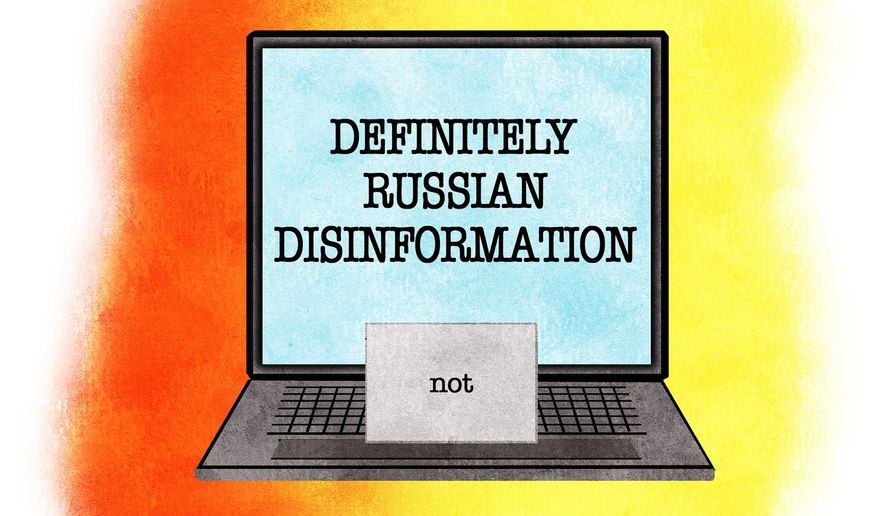OPINION:
Now that everyone acknowledges that Hunter Biden’s laptop is authentic, just as it was when first reported by the New York Post in October 2020, some pretty aggressive rewriting of history is going on.
Republicans now control the House of Representatives and have made it plain that they’ll examine the saga of the laptop, the contents of which connect Hunter’s father, now-President Biden, to his family’s lucrative business of selling access to him. Because of this new congressional scrutiny, some who conspired to falsely cast the laptop story as “Russian disinformation” are scrambling to alter the record.
Former Director of National Intelligence James Clapper was one of the biggest names — and the first listed — in an open letter issued on Oct. 19, 2020, that was intended to protect then-candidate Joe Biden from political damage in the wake of the laptop bombshell just over two weeks before the last presidential election.
First reported by Politico, the letter expressed the view of 51 identified “former senior intelligence officials” (and nine anonymous others they said could not be named publicly) that the laptop had “all the classic earmarks of a Russian information operation.”
The signers wrote that they all had “an understanding of the wide range of Russian overt and covert activities that undermine U.S. national security” and that “[i]f we are right, this is Russia trying to influence how Americans vote in this election.”
The letter said the laptop itself was “consistent with Russian objectives” and “key methods Russia has used,” and concludes with the declarative sentence, “It is high time that Russia stops interfering in our democracy.”
The authors did write that they didn’t have proof of these charges and had not actually seen the laptop’s contents, but that didn’t stop them from making their assertions anyway. And they waved away the possibility of being wrong since they were confident of “knowing Russian behavior intimately” and believing that “our experience makes us deeply suspicious that the Russian government played a significant role in this case.”
The letter did exactly what they wanted.
News outlets from coast to coast in the U.S. and worldwide seized on it and used it as a key excuse not to report on the laptop or its implications. I know this happened because I was the Trump 2020 communications director, and we unsuccessfully pleaded with the news media to cover the story in the final two weeks of the campaign.
But now, new House Judiciary Committee Chairman Jim Jordan, Ohio Republican, has reached out to a dozen of the signatories, asking to speak to them about the letter. So the narrative must be changed retroactively. Enter Glenn Kessler, billed as “the Fact Checker” for The Washington Post, who contacted those 12 signers.
“All we were doing was raising a yellow flag that this could be Russian disinformation,” Mr. Clapper told Mr. Kessler. “Politico deliberately distorted what we said.”
“No one who has spent time in Washington should be surprised that journalists and politicians willfully or unintentionally misconstrue oral or written statements,” said another signatory, Thomas Fingar, formerly the State Department’s top intelligence official.
You see, it was all Politico’s fault. Mr. Kessler even made the publication defend itself in a statement that read, in part, “The article fairly and accurately reported on — and summarized — the intelligence officials’ letter.”
That’s obviously true and is supported by the fact that just three days before the open letter dropped in 2020, Mr. Clapper was on CNN expressing his clear view that the laptop was a Russian operation. And there was no ambiguity.
“To me, this is just classic textbook Soviet Russian tradecraft at work,” Mr. Clapper told CNN’s Erin Burnett on Oct. 16, 2020. “The Russians have analyzed the target. They understand that the president and his enablers crave dirt on Vice President Biden. Whether it’s real or contrived, that doesn’t matter to them, and so all of a sudden, two-and-a-half weeks before the election, this laptop appears somehow, and emails on it without any metadata.”
For Mr. Clapper and others to claim now that they didn’t mean to cement the “Russian disinformation” narrative is obvious nonsense. This comes more than two years later, and none of them registered any public objection to Politico’s characterization until now.
It’s as if the NFL official who effectively ended last Sunday’s Super Bowl by calling a late penalty on the Philadelphia Eagles suddenly said that he didn’t mean it was DEFINITELY a foul — he just wanted to warn everybody that it could have been.
That wouldn’t fly, and this shouldn’t either.
Because some of the same people who were cynically moaning about disinformation back then are now spreading falsehoods about what they were up to at the time. And The Washington Post is helping them do it.
• Tim Murtaugh is a Washington Times columnist and the vice president for communication strategy at National Public Affairs, a political consulting firm.




Please read our comment policy before commenting.